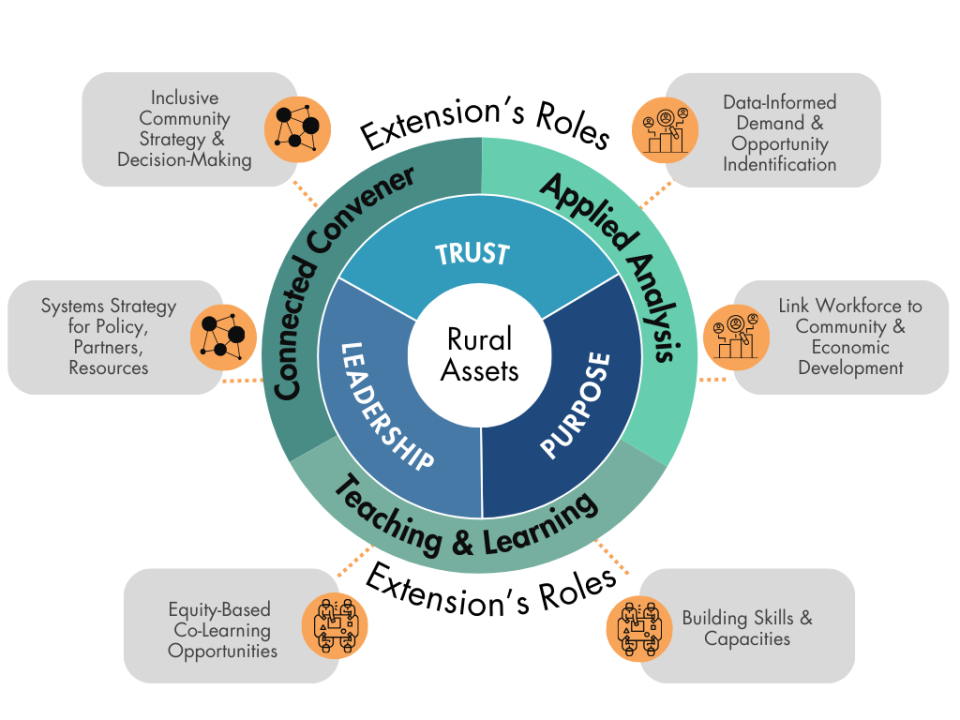Demonstration Sites
Through this project, NCHEMS will be awarding three to five grants ranging from $18,000 to $30,000 to implement one or more components of the project framework in 2025. Eligible grantees are land grant universities, Cooperative Extension services, rural economic development organizations, or other nonprofit organizations that currently work with or have demonstrated potential to work with Cooperative Extension services in their area on projects related to community, economic, and workforce development in rural settings. These dollars may support the sustainability of community, economic, and workforce development efforts that are already in place, or the creation of new efforts that the grantee would like to undertake. Rather than providing pre-determined uses of grant funds, grantees are invited to creatively propose uses to support work within the framework. In addition to targeted funding, the selected organizations will also receive support from NCHEMS. This support will include:
- Labor market analysis for specific geographies of interest to the organization and the project, using proprietary data sources and a process established by leaders in the field through Module 2 of the FORWARD curriculum.
- Stakeholder engagement activities to present, analyze, and apply labor market information to the project’s goals and objectives.
- Invitation to participate in a learning community for collaboration and peer learning with other projects funded through this opportunity.
- Project check-ins throughout the course of the work.
Selected organizations should be prepared to participate through in-person and virtual meetings with the NCHEMS team and the peer organizations in the cohort beginning in the spring of 2025 and continuing throughout the year. These meetings are intended to support communication and learning across projects. NCHEMS will reimburse all attendees for their travel expenses to in-person meetings outside of their grants.
Demonstration Sites Process
Interested organizations should complete the form below by Jan. 6, 2025. NCHEMS will reach out to selected partner organizations by early February to learn more about proposed projects and answer any questions. NCHEMS anticipates that grants will be disbursed to partner organizations by the end of February 2025. Work should be ready for a final report out to the full group of grantees by the end of December 2025.
Selected Demonstration Sites
NCHEMS is excited to announce the five organizations and projects we will be supporting this year: the Colorado State University Office of Engagement and Extension, the University of Maine Cooperative Extension, the University of Missouri Extension, the Southern Rural Development Center, and the University of Tennessee Center for Industrial Services.
- Partner: Colorado State University Office of Engagement and Extension
- EARNS is exploring new partnerships between Colorado State University Extension and rural community colleges to strengthen its accessible education and workforce development initiatives. NCHEMS support allows for an external assessment that will examine prospective employers’ preferences regarding postsecondary certification versus badging programs to better support underserved rural learners in their pursuit of securing living wage employment within their home communities.
- Project Lead: Eric Ishiwata, Ph.D
- Partner: University of Maine Cooperative Extension
- There is an unmet need among Maine’s small business owners and employees to get high-quality training in key elements of business from the Maine Business School (MBS) and the University of Maine Cooperative Extension (CE). Across dozens of conversations with business owners and leaders and connections with state agencies, it is clear that there are many individuals throughout the state who need additional knowledge about many of the core areas of business. Training Maine’s distributed workforce in these building blocks of business education through dynamic, online courses enables MBS and CE to meet participants where they are at and lets them learn at their own pace while earning a UMS badge upon successful completion. The MBS and CE have identified an opportunity to develop micro-badges around key business topics to support small business owners and workforce training badly needed in the state of Maine. Starting with a pilot offering called “Finances in a Flash”, CE proposes to build a stackable set of micro-badges under the Business in a Flash brand. Each micro-badge will take participants between 90 and 120 minutes to complete at the cost of only $24.99. Successful completion will earn the participant a University of Maine System (UMS) badge.
- Project Lead: Hannah Carter, Ph.D.
- Partner: University of Missouri Extension
- Thanks to funding provided by NCHEMS, MU Extension, along with regional partners, will be hosting Workforce Training Summits in six locations around Missouri in 2025. These summits will engage employers with the state of the workforce through data-driven insights, including facts about unemployment vs. under-employment in Missouri. Ending with round table discussions to help identify where opportunities lie for potential next steps in meeting unmet workforce training needs.
- Project Lead: Sarah Traub, Ed.D.
- Partner: Southern Rural Development Center at Mississippi State University
- This project aims to provide Extension Community Development (CD) practitioners nationwide with core competency skill training in community and economic development. Through a train-the-practitioner approach, this initiative will enhance the capacity of Extension professionals at land-grant institutions to engage and lead community stakeholders through community development efforts. The project will consist of curriculum development, a summer training workshop, support of a national Extension CD resource-sharing network, and evaluate the impact of the training, curriculum, and resource-sharing network.
- Project Lead: Grace Langford
- Partner: University of Tennessee Center for Industrial Services
- The UT Center for Industrial Services (UT CIS) will collaborate with UT Extension and other partners to grow a Tennessee Workforce Development Academy (WDA) to meet the professional development needs of workforce developers in rural communities. Participants in the 2.5-day course benefit from panel discussions, networking, and expert instruction that facilitates learning and alignment. Critical topics include skills gaps, workforce challenges, emerging trends, and linkages between economic and workforce development at the local, regional, and state levels.
- Project Lead: Kim Denton

